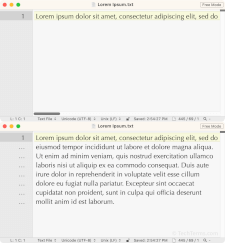Word Wrap
Word wrapping is when a line of text automatically "wraps" to the following line when it reaches the edge of a page or text field. Most text editors and word processors use word wrap to keep the text within the default margins of the page. Without word wrap enabled, the text continues on one line until the user presses "Enter" or "Return" to insert a line break. If the text extends past the window margin, the user must scroll horizontally to see the whole line.
When word wrap is enabled, the text editor takes the first word that does not fit on a line of text and moves it to the beginning of the next line. Word processing programs can also automatically hyphenate long words at the end of a line.
You can also prevent word wrap from breaking for a new line between two words by using a non-breaking space character instead of a normal space. Text editors treat two words separated by a non-breaking space as if they are a single word, instead breaking at the next available normal space.
NOTE: While it is uncommon, sometimes a word (or string of characters) will take up more than one line. In this case, the word wrap feature will break the string of characters once it reaches the end of the line and continue it onto the next one.
 Test Your Knowledge
Test Your Knowledge